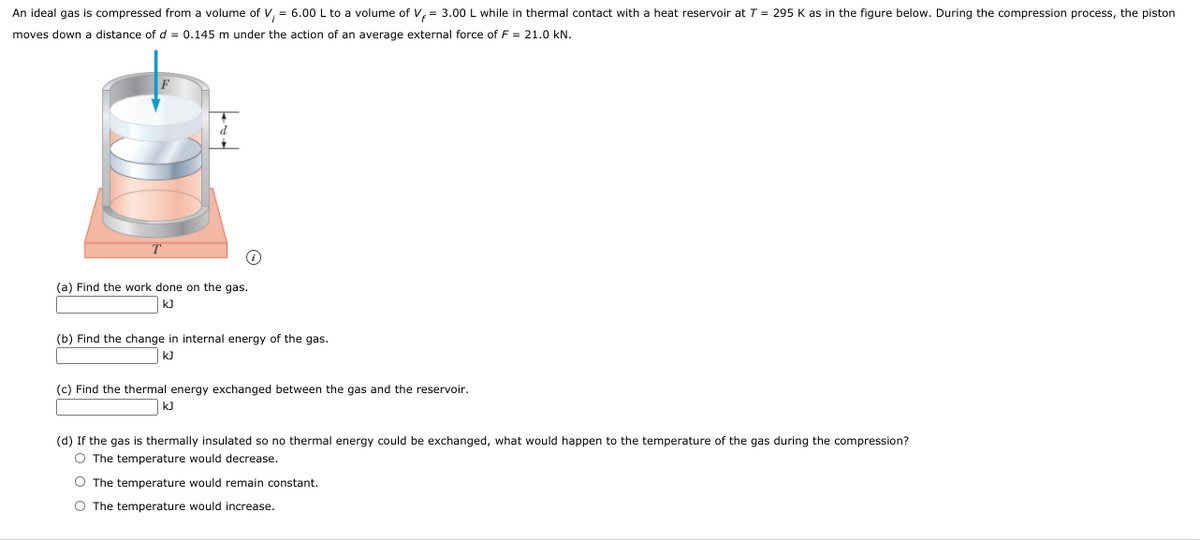An ideal gas is compressed from a volume of V, = 6.00 L to a volume of V, = 3.00 L while in thermal contact with a heat reservoir at T = 295 K as in the figure below. During the compression process, the piston moves down distance of d = 0.145 m under the action of an average external force of F = 21.0 kN. F (a) Find the work done on the gas. kJ (b) Find the change in internal energy of the gas. kJ (c) Find the thermal energy exchanged between the gas and the reservoir.
An ideal gas is compressed from a volume of V, = 6.00 L to a volume of V, = 3.00 L while in thermal contact with a heat reservoir at T = 295 K as in the figure below. During the compression process, the piston moves down distance of d = 0.145 m under the action of an average external force of F = 21.0 kN. F (a) Find the work done on the gas. kJ (b) Find the change in internal energy of the gas. kJ (c) Find the thermal energy exchanged between the gas and the reservoir.
Elements Of Electromagnetics
7th Edition
ISBN:9780190698614
Author:Sadiku, Matthew N. O.
Publisher:Sadiku, Matthew N. O.
ChapterMA: Math Assessment
Section: Chapter Questions
Problem 1.1MA
Related questions
Concept explainers
Heat Exchangers
Heat exchangers are the types of equipment that are primarily employed to transfer the thermal energy from one fluid to another, provided that one of the fluids should be at a higher thermal energy content than the other fluid.
Heat Exchanger
The heat exchanger is a combination of two words ''Heat'' and ''Exchanger''. It is a mechanical device that is used to exchange heat energy between two fluids.
Question

Transcribed Image Text:An ideal gas is compressed from a volume of V, = 6.00 L to a volume of V, = 3.00 L while in thermal contact with a heat reservoir at T = 295 K as in the figure below. During the compression process, the piston
moves down a distance of d = 0.145 m under the action of an average external force of F = 21.0 kN.
(a) Find the work done on the gas.
kJ
(b) Find the change in internal energy of the gas.
k)
(c) Find the thermal energy exchanged between the gas and the reservoir.
kJ
(d) If the gas is thermally insulated so no thermal energy could be exchanged, what would happen to the temperature of the gas during the compression?
O The temperature would decrease.
O The temperature would remain constant.
O The temperature would increase.
Expert Solution
Step 1
_1.jpg)
Step by step
Solved in 2 steps with 2 images

Knowledge Booster
Learn more about
Need a deep-dive on the concept behind this application? Look no further. Learn more about this topic, mechanical-engineering and related others by exploring similar questions and additional content below.Recommended textbooks for you

Elements Of Electromagnetics
Mechanical Engineering
ISBN:
9780190698614
Author:
Sadiku, Matthew N. O.
Publisher:
Oxford University Press

Mechanics of Materials (10th Edition)
Mechanical Engineering
ISBN:
9780134319650
Author:
Russell C. Hibbeler
Publisher:
PEARSON

Thermodynamics: An Engineering Approach
Mechanical Engineering
ISBN:
9781259822674
Author:
Yunus A. Cengel Dr., Michael A. Boles
Publisher:
McGraw-Hill Education

Elements Of Electromagnetics
Mechanical Engineering
ISBN:
9780190698614
Author:
Sadiku, Matthew N. O.
Publisher:
Oxford University Press

Mechanics of Materials (10th Edition)
Mechanical Engineering
ISBN:
9780134319650
Author:
Russell C. Hibbeler
Publisher:
PEARSON

Thermodynamics: An Engineering Approach
Mechanical Engineering
ISBN:
9781259822674
Author:
Yunus A. Cengel Dr., Michael A. Boles
Publisher:
McGraw-Hill Education

Control Systems Engineering
Mechanical Engineering
ISBN:
9781118170519
Author:
Norman S. Nise
Publisher:
WILEY

Mechanics of Materials (MindTap Course List)
Mechanical Engineering
ISBN:
9781337093347
Author:
Barry J. Goodno, James M. Gere
Publisher:
Cengage Learning

Engineering Mechanics: Statics
Mechanical Engineering
ISBN:
9781118807330
Author:
James L. Meriam, L. G. Kraige, J. N. Bolton
Publisher:
WILEY